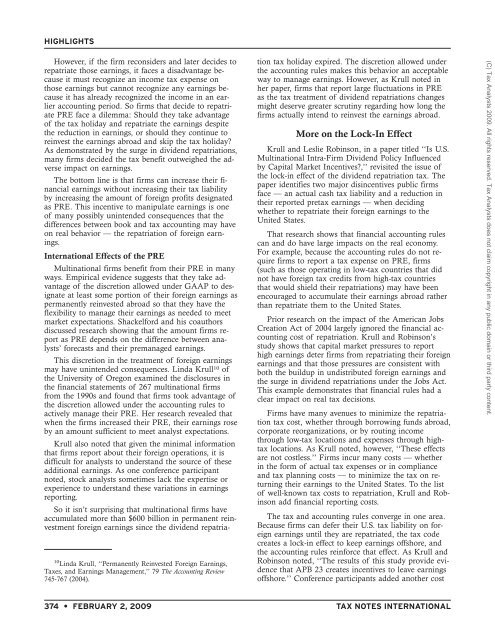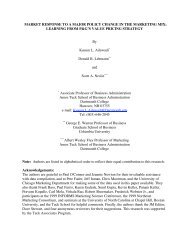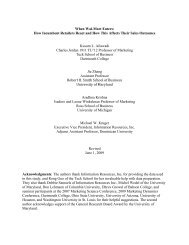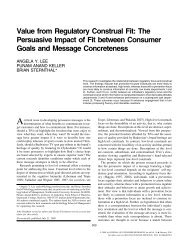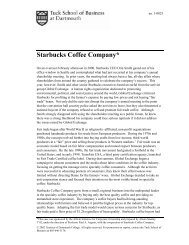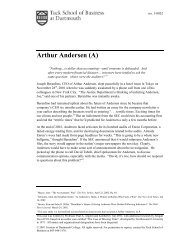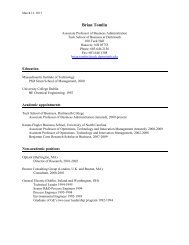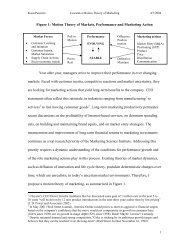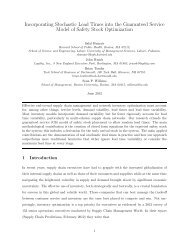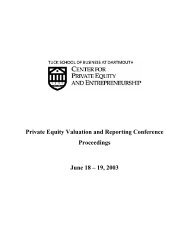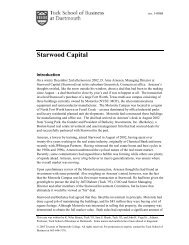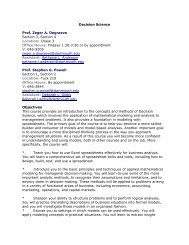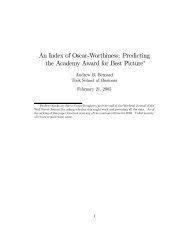tax notes international - Tuck School of Business - Dartmouth College
tax notes international - Tuck School of Business - Dartmouth College
tax notes international - Tuck School of Business - Dartmouth College
Create successful ePaper yourself
Turn your PDF publications into a flip-book with our unique Google optimized e-Paper software.
HIGHLIGHTS<br />
However, if the firm reconsiders and later decides to<br />
repatriate those earnings, it faces a disadvantage because<br />
it must recognize an income <strong>tax</strong> expense on<br />
those earnings but cannot recognize any earnings because<br />
it has already recognized the income in an earlier<br />
accounting period. So firms that decide to repatriate<br />
PRE face a dilemma: Should they take advantage<br />
<strong>of</strong> the <strong>tax</strong> holiday and repatriate the earnings despite<br />
the reduction in earnings, or should they continue to<br />
reinvest the earnings abroad and skip the <strong>tax</strong> holiday?<br />
As demonstrated by the surge in dividend repatriations,<br />
many firms decided the <strong>tax</strong> benefit outweighed the adverse<br />
impact on earnings.<br />
The bottom line is that firms can increase their financial<br />
earnings without increasing their <strong>tax</strong> liability<br />
by increasing the amount <strong>of</strong> foreign pr<strong>of</strong>its designated<br />
as PRE. This incentive to manipulate earnings is one<br />
<strong>of</strong> many possibly unintended consequences that the<br />
differences between book and <strong>tax</strong> accounting may have<br />
on real behavior — the repatriation <strong>of</strong> foreign earnings.<br />
International Effects <strong>of</strong> the PRE<br />
Multinational firms benefit from their PRE in many<br />
ways. Empirical evidence suggests that they take advantage<br />
<strong>of</strong> the discretion allowed under GAAP to designate<br />
at least some portion <strong>of</strong> their foreign earnings as<br />
permanently reinvested abroad so that they have the<br />
flexibility to manage their earnings as needed to meet<br />
market expectations. Shackelford and his coauthors<br />
discussed research showing that the amount firms report<br />
as PRE depends on the difference between analysts’<br />
forecasts and their premanaged earnings.<br />
This discretion in the treatment <strong>of</strong> foreign earnings<br />
may have unintended consequences. Linda Krull10 <strong>of</strong><br />
the University <strong>of</strong> Oregon examined the disclosures in<br />
the financial statements <strong>of</strong> 267 multinational firms<br />
from the 1990s and found that firms took advantage <strong>of</strong><br />
the discretion allowed under the accounting rules to<br />
actively manage their PRE. Her research revealed that<br />
when the firms increased their PRE, their earnings rose<br />
by an amount sufficient to meet analyst expectations.<br />
Krull also noted that given the minimal information<br />
that firms report about their foreign operations, it is<br />
difficult for analysts to understand the source <strong>of</strong> these<br />
additional earnings. As one conference participant<br />
noted, stock analysts sometimes lack the expertise or<br />
experience to understand these variations in earnings<br />
reporting.<br />
So it isn’t surprising that multinational firms have<br />
accumulated more than $600 billion in permanent reinvestment<br />
foreign earnings since the dividend repatria-<br />
10 Linda Krull, ‘‘Permanently Reinvested Foreign Earnings,<br />
Taxes, and Earnings Management,’’ 79 The Accounting Review<br />
745-767 (2004).<br />
tion <strong>tax</strong> holiday expired. The discretion allowed under<br />
the accounting rules makes this behavior an acceptable<br />
way to manage earnings. However, as Krull noted in<br />
her paper, firms that report large fluctuations in PRE<br />
as the <strong>tax</strong> treatment <strong>of</strong> dividend repatriations changes<br />
might deserve greater scrutiny regarding how long the<br />
firms actually intend to reinvest the earnings abroad.<br />
More on the Lock-In Effect<br />
Krull and Leslie Robinson, in a paper titled ‘‘Is U.S.<br />
Multinational Intra-Firm Dividend Policy Influenced<br />
by Capital Market Incentives?,’’ revisited the issue <strong>of</strong><br />
the lock-in effect <strong>of</strong> the dividend repatriation <strong>tax</strong>. The<br />
paper identifies two major disincentives public firms<br />
face — an actual cash <strong>tax</strong> liability and a reduction in<br />
their reported pre<strong>tax</strong> earnings — when deciding<br />
whether to repatriate their foreign earnings to the<br />
United States.<br />
That research shows that financial accounting rules<br />
can and do have large impacts on the real economy.<br />
For example, because the accounting rules do not require<br />
firms to report a <strong>tax</strong> expense on PRE, firms<br />
(such as those operating in low-<strong>tax</strong> countries that did<br />
not have foreign <strong>tax</strong> credits from high-<strong>tax</strong> countries<br />
that would shield their repatriations) may have been<br />
encouraged to accumulate their earnings abroad rather<br />
than repatriate them to the United States.<br />
Prior research on the impact <strong>of</strong> the American Jobs<br />
Creation Act <strong>of</strong> 2004 largely ignored the financial accounting<br />
cost <strong>of</strong> repatriation. Krull and Robinson’s<br />
study shows that capital market pressures to report<br />
high earnings deter firms from repatriating their foreign<br />
earnings and that those pressures are consistent with<br />
both the buildup in undistributed foreign earnings and<br />
the surge in dividend repatriations under the Jobs Act.<br />
This example demonstrates that financial rules had a<br />
clear impact on real <strong>tax</strong> decisions.<br />
Firms have many avenues to minimize the repatriation<br />
<strong>tax</strong> cost, whether through borrowing funds abroad,<br />
corporate reorganizations, or by routing income<br />
through low-<strong>tax</strong> locations and expenses through high<strong>tax</strong><br />
locations. As Krull noted, however, ‘‘These effects<br />
are not costless.’’ Firms incur many costs — whether<br />
in the form <strong>of</strong> actual <strong>tax</strong> expenses or in compliance<br />
and <strong>tax</strong> planning costs — to minimize the <strong>tax</strong> on returning<br />
their earnings to the United States. To the list<br />
<strong>of</strong> well-known <strong>tax</strong> costs to repatriation, Krull and Robinson<br />
add financial reporting costs.<br />
The <strong>tax</strong> and accounting rules converge in one area.<br />
Because firms can defer their U.S. <strong>tax</strong> liability on foreign<br />
earnings until they are repatriated, the <strong>tax</strong> code<br />
creates a lock-in effect to keep earnings <strong>of</strong>fshore, and<br />
the accounting rules reinforce that effect. As Krull and<br />
Robinson noted, ‘‘The results <strong>of</strong> this study provide evidence<br />
that APB 23 creates incentives to leave earnings<br />
<strong>of</strong>fshore.’’ Conference participants added another cost<br />
374 • FEBRUARY 2, 2009 TAX NOTES INTERNATIONAL<br />
(C) Tax Analysts 2009. All rights reserved. Tax Analysts does not claim copyright in any public domain or third party content.


